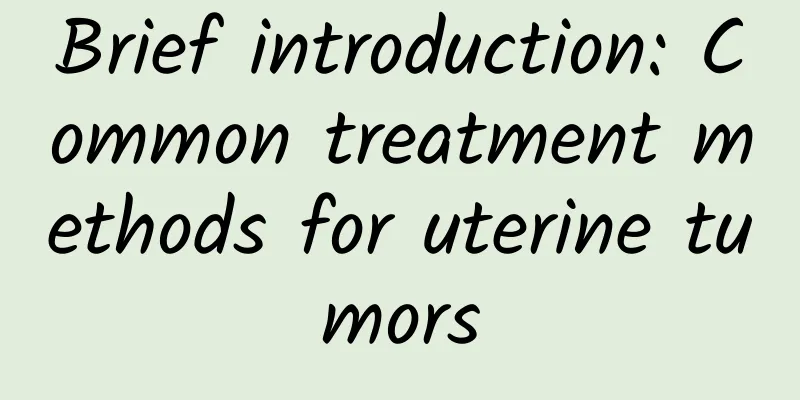Brief introduction: Common treatment methods for uterine tumors

|
As the incidence of uterine tumors continues to rise, more and more people are beginning to pay attention to the relevant knowledge of uterine tumors, among which the methods of treating uterine tumors are the focus of everyone's attention. The following is a brief introduction to the common methods of treating uterine tumors. In general, the common methods of treating uterine tumors are: 1. Surgical treatment: When the size of uterine fibroids is equivalent to that of a pregnant uterus for more than one and a half months, surgical treatment is required to treat uterine tumors. In addition, if the fibroids grow rapidly, protrude into the abdominal cavity and have a tendency to twist, they should also be surgically removed. Of course, other indications such as severe anemia, heart disease, and general condition should also be considered when determining surgical treatment for uterine tumors. 2. Conservative treatment: This method of treating uterine tumors must be carried out under certain conditions. First, the size of the uterine fibroids does not exceed the size of a 6-week pregnancy; second, the patient is already postmenopausal and has no symptoms; third, the patient is near menopause and can use non-surgical treatment to reduce bleeding and cannot tolerate surgery. The main conditions are: 1) Expectant treatment: Expectant treatment is suitable for patients who are over 40-50 years old and have begun to experience menopause, and have no obvious clinical symptoms such as excessive bleeding and pain. It is a common conservative treatment method for uterine tumors. 2) Drug treatment: The current conservative treatment of uterine tumors is mainly drug treatment, which can avoid the pain and sequelae caused by surgery. If drug treatment is not ideal, then consider minimally invasive or surgical treatment of uterine tumors. Drug treatment is divided into traditional Chinese medicine treatment and Western medicine treatment. Traditional Chinese medicine often uses Chinese herbal decoctions, Chinese patent medicines, etc. to regulate the endocrine system and microcirculation in female patients, regulate blood and qi, disperse blood stasis and resolve knots, and treat uterine fibroids from the source; Western medicine often uses androgens for treatment of those who are close to menopause, have menstrual disorders, and have no malignant changes in the endometrium. The above is an introduction to the common methods of treating uterine tumors. I believe everyone has some understanding of this. Patients should choose the method of treating uterine tumors that suits them according to their actual condition and should not choose blindly. For more information, please visit the uterine tumor disease special topic at http://www..com.cn/fuke/zgjl/ or consult an expert for free. The expert will then give a detailed answer based on the patient's specific situation. |
<<: Experts explain the hazards of four common uterine tumors
>>: Brief analysis of common symptoms of moderate cervical erosion
Recommend
What are the symptoms of uterine fibroids? What are the prevention methods of uterine fibroids?
The early symptoms of uterine fibroids are very s...
How much does it cost to treat pelvic peritonitis?
Because the female pelvic cavity contains many ti...
Save 640,000 obese schoolchildren: Eat more fruits and vegetables to lose weight and prevent cancer
Being fat as a child is not a blessing! Studies h...
The three main causes of ovarian cysts
What causes ovarian cysts? This is a question tha...
What are the clinical manifestations of cervical hypertrophy?
In life, cervical hypertrophy is a very common di...
What is the cause of the left ovarian cyst and how to treat it
Ovarian tumors are common tumors of the female re...
Two major internal and external factors that cause ovarian cysts
The cause of any disease can be discussed from tw...
What are the symptoms of female cervical erosion? What are the causes of female cervical erosion?
In today's society, more and more women are s...
How to treat female cervical erosion? 3 best treatments for female cervical erosion
In daily life, many women have bad living habits,...
It is important to know the early symptoms of cervical hypertrophy
There are various female diseases in life, and ce...
Causes of adnexitis in virgins
Adnexitis is a common gynecological disease, but ...
Cure rate of habitual abortion
With the accelerated pace of life and the increas...
How to regulate scanty menstruation?
Menstruation is a physiological phenomenon that e...
Does abnormal vaginal discharge have a bad smell?
Abnormal vaginal discharge may be accompanied by ...
Are you eating the right spices? Pairing with red meat
Spices such as green onions, ginger, garlic, and ...









